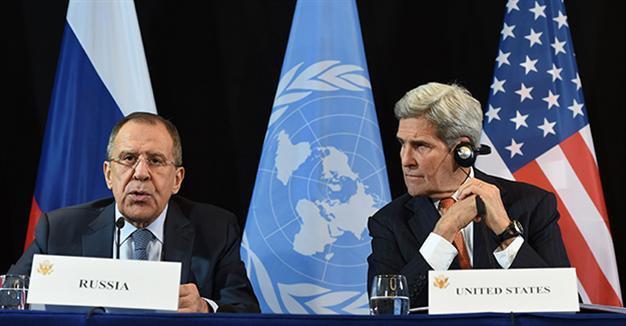Russia, US can coordinate actions against ISIL in Syria, says Lavrov
MOSCOW

AFP Photo
Russia is ready to coordinate with the United States to retake the rebel strongholds of Syria’s Raqqa and Palmyra, said Russian FM Sergei Lavrov, as United Nations-sponsored peace talks resumed in Geneva.
“We are ready to coordinate our actions with the Americans, because Raqqa is in eastern Syria and there mainly the U.S. coalition is active,” Lavrov said. “The Americans even suggested to us … let’s divide up the labor: you, the Russian air force, concentrate on liberating Palmyra, and we the American coalition will concentrate on liberating Raqqa.”
One day after Lavrov’s remarks, the fresh round of talks started in Geneva under the brokering of the U.N. special envoy for Syria Staffan de Mistura.
Syria faces a moment of truth, de Mistura said on March 14, as he opened the first of three rounds of peace talks envisaged to negotiate a “clear roadmap” for a future Syria.
Saying there was no “plan B” but a return to war, de Mistura asked to hear from all sides but said he would have no hesitation in calling in the big powers, led by the U.S. and Russia, if the talks get bogged down.
“If during these talks and in the next rounds we will see no notice of any willingness to negotiate... we will bring the issue back to those who have influence, and that is the Russian Federation, the USA... and to the Security Council,” he was quoted as saying a news conference by Reuters.
The talks, which start on the fifth anniversary of the beginning of the civil war in Syria, are the first to be held in more than two years and come amid an unprecedented cessation in hostilities sponsored by Washington and Moscow and accepted by Syrian President Bashar al-Assad’s government and most of his foes.
The truce, the first of its kind in a five-year-old war that has killed 250,000 people, has sharply reduced the fighting over the past two weeks, giving rise to hope that this diplomatic initiative will succeed where all previous efforts failed. The cessation was agreed after de Mistura called off a previous attempt to convene talks last month.
The talks must focus on political transition, which is the “mother of all issues,” de Mistura said, while separate taskforces would keep tackling humanitarian issues and the cessation of hostilities. “As far as I know, the only Plan B available is return to war, and to even worse war than we had so far.”
The first round of talks will end around March 24, followed by a break of seven to 10 days, then a second round of at least two weeks before another recess and a third round.
“By then we believe we should have at least a clear roadmap. I’m not saying agreement, but a clear roadmap because that’s what Syria is expecting from all of us,” de Mistura said.
Coming out of the first official meeting under the new round of Geneva talks, the head of the Syrian government delegation to the indirect peace talks in Geneva, Bashar Ja’afari, said his side’s discussions with de Mistura were “positive and constructive.”
Ja’afari told reporters after the meeting that the government delegation “submitted ideas and views” for a political solution to the crisis.
He said de Mistura would meet the representatives of the opposition on March 15 and the government team again on the following day.
Ja’afari said his team wants “to negotiate as Syrians under Syrian leadership without foreign intervention and without preconditions.”
He said any party that opposes this premise is “trying to sabotage this round.”
He was referring to the oppositions demands from the previous round that failed in early February, demands that had included an end to bombardment, release of detainees and the lifting of the siege by government troops on rebel-held areas across Syria.
